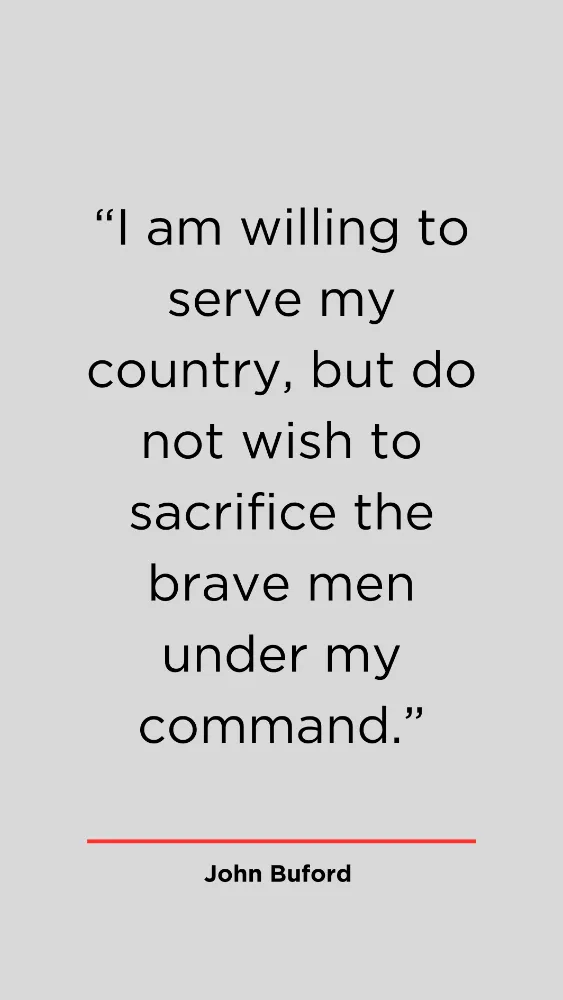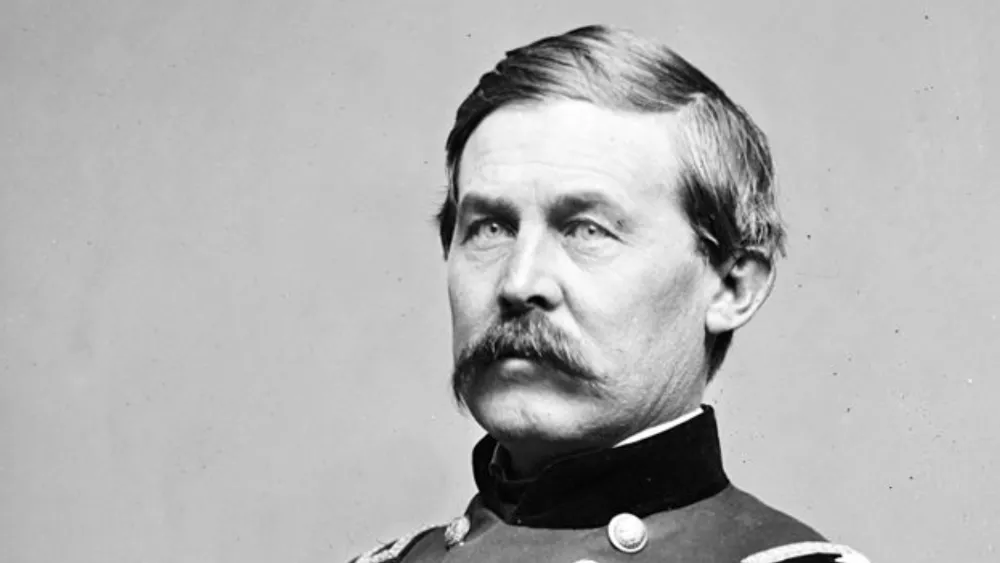General John Buford, a United States cavalry officer, is most renowned for his role in the Battle of Gettysburg. As a West Point graduate, he displayed loyalty to the Union, even though he hailed from the border state of Kentucky. Throughout the Civil War, he participated in numerous significant engagements. Tragically, at the age of 37, Buford succumbed to typhoid fever. Notably, just prior to his passing, he received a promotion from President Abraham Lincoln to the rank of Major General.
Military Heritage of John Buford
When the Civil War erupted in 1861, John Buford, like many of his fellow West Point graduates, confronted a momentous decision. The nation’s division meant that choosing one side would lead to conflict with former comrades and friends.
This familial connection to the military world, embedded in a small Kentucky town, sowed the seeds of a remarkable career in the making.
With this inherent sense of duty and honor, it was almost predestined that John Buford took on a path of service to his country. His journey led him to the United States Military Academy at West Point. This is where he pursued his education with determination and discipline.
Buford’s journey did not stop at graduation. It marked the beginning of a life dedicated to serving his nation. He ventured into the U.S. Army, assuming various roles and responsibilities, each contributing to his growing expertise as a military officer.
Moreover, his military career took him to the front lines during the Mexican-American War. It is where he gained firsthand experience in the crucible of battle. Therefore, it shaped his character and refined his tactical acumen.
A Nation Divided: The Difficult Choice of Allegiance
When the Civil War erupted in 1861, John Buford, like many of his fellow West Point graduates, faced a momentous decision. The nation was divided, and loyalty to one side meant conflict with former comrades and friends.
Despite the difficult choice, Buford’s allegiance remained steadfastly with the Union. Committed to preserving the United States, he enlisted in the Union Army. Buford was determined to play his part in this epic struggle.
Furthermore, his early service in the Union Army placed him in the Western Theater. Thereafter, he gained invaluable experience and honed his military skills. However, he would etch his name into the history of the Eastern Theater of the war. As the war unfolded, the Eastern Theater would become the epicenter of some of the most significant battles. Moreover, it was here that John Buford’s indomitable spirit and leadership would shine.
The turning point in Buford’s military career, and the defining moment of his life, occurred in 1863 during the Battle of Gettysburg. His division received a critical mission: to hold and defend the strategic town of Gettysburg.
Buford’s Bold Initiative: The Decision to Engage
John Buford’s decision to engage the Confederates at Gettysburg proved to be a masterstroke of strategy. It was a pivotal moment in the battle that would influence the course of the entire conflict. On the fateful day of July 1, 1863, Buford’s cavalry division confronted Confederate forces under General Henry Heth. Although outnumbered, Buford’s men displayed extraordinary courage and tenacity despite overwhelming odds.
In a remarkable display of valor, Buford’s troopers fiercely resisted Heth’s advancing Confederates. They held their ground, defending the strategic high ground northwest of Gettysburg.
This stand bought precious time for the Union infantry forces to arrive. It is difficult to exaggerate how important this is because the high ground Buford’s soldiers protected would later serve as the cornerstone of the Union army’s defensive lines during the Battle of Gettysburg.
Buford’s quick thinking and determination were instrumental in shaping the course of the battle. His ability to recognize the strategic value of the high ground, coupled with his resolute defense, set the stage for the Union’s eventual victory.
A Hero’s Untimely Demise: Remembering John Buford
John Buford’s remarkable contributions to the Union cause at Gettysburg did not go unnoticed. In the aftermath of the battle, General George G. Meade personally commended Buford for his gallant performance.
Meade’s recognition of Buford’s pivotal role highlighted the importance of his strategic brilliance and determination during those crucial days in July 1863.
Despite his acclaim, Buford’s career would be tragically cut short. The toll of war, both physical and mental, weighed heavily on him. His relentless dedication and challenges on the battlefield affected his health.
On December 16, 1863, at 37, John Buford succumbed to typhoid fever. His untimely death marked the passing of a brilliant military mind and a true hero of the Civil War.
Buford’s legacy endures as a symbol of unyielding commitment, resilience, and the selfless dedication of those who served in a war that shaped the destiny of the United States. His name may not be as widely recognized as some of his contemporaries, but his impact on history and his legacy as a hero of the Civil War remain indelible.

The Crucial Role of Leadership: Buford’s Legacy in the Civil War
John Buford, though not as celebrated as some of his more renowned contemporaries, remains a crucial and inspirational figure in the history of the United States. His contributions to the Union cause should be etched in the annals of history as a testament to the principles he fought for. Buford’s actions at Gettysburg were nothing short of remarkable.
His quick thinking and resolute defense in the face of overwhelming odds were instrumental in setting the stage for a Union victory that would be instrumental in the Civil War. The high ground he held and the time he bought for Union infantry to reinforce their positions were pivotal in securing the victory at Gettysburg, a battle that altered the course of the war.
John Buford’s legacy is a shining example of leadership, determination, and commitment to the ideals of liberty and unity. The story of John Buford, the unsung hero of Gettysburg, deserves to be remembered, celebrated, and revered as a vital part of the rich tapestry of American history.




